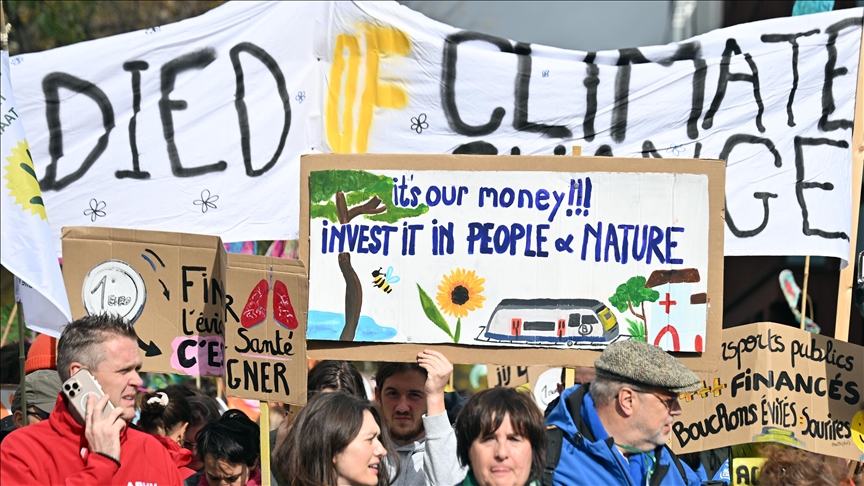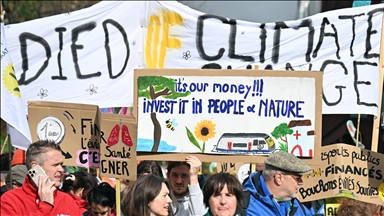INTERVIEW – UNEP warns of race against time to deliver climate finance
Vulnerable countries are being forced to confront intensifying climate shocks without the resources or capacity to adapt, says Jamil Ahmad, UNEP’s director of intergovernmental affairs
 Thousands of environmental activists take part in a march to draw attention to global warming and climate change in Brussels, Belgium on October 05, 2025.
Thousands of environmental activists take part in a march to draw attention to global warming and climate change in Brussels, Belgium on October 05, 2025.
- Vulnerable countries are being forced to confront intensifying climate shocks without the resources or capacity to adapt, says Jamil Ahmad, UNEP’s director of intergovernmental affairs
- ‘Action is at hand, but the intensity of the problem is so severe that these efforts sometimes lag behind,’ says Ahmad
ANKARA
The world must not lose the window to deploy climate finance at the scale needed to prevent catastrophe, the UN Environment Programme (UNEP) has stated ahead of the upcoming UN climate summit in Brazil.With each passing storm, flood or drought, developing nations are buckling under the strain. Without adequate esources or capacity to adapt, environmental disasters and climate shocks will intensify , Jamil Ahmad, UNEP’s director of intergovernmental affairs, told Anadolu.
He stated that climate change knew no boundaries. No one country can address this problem alone. Multilateralism offered a way out through partnerships, collaboration and regional co-operative frameworks. He noted that the widening gap between financial needs of climate vulnerable nations and available funds can derail climate actiion and threaten global stability, warning that climate action has become a race against time that developing nations cannot win alone.
Ahmad emphasized that South Asia – including Bangladesh, Nepal, and Pakistan – suffers disproportionately despite low emissions. “Some countries are contributing very minimal, but they still are affected in a big way by climate change,” Ahmad said.
The crux, he added, lies in lack of ability: “Developing countries lack the capacity to be resilient … that’s why the impact is so pronounced and so severe.”
According to the World Bank, over the past two decades more than half of South Asia’s population – some 750 million people – have experienced at least one disaster such as drought, flooding, or a cyclone.
This year, heavy rains and floods have claimed more than 1,000 lives in Pakistan, sweeping away villages, submerging farmland, and forcing over 2 million people from their homes. India and Nepal have also faced similar disasters that have claimed dozens of lives and caused massive damages.
- Disasters undermine development
Ahmad outlined how acute shocks such as floods, landslides and wildfires devastate livelihoods and infrastructure. Their long-term legacy, he said, is even more insidious: declines in crop yields, water scarcity, food insecurity, and public health costs.
“When a healthy worker falls ill due to air pollution … the whole family is affected,” he said. “If children are affected, they lose school time. If the elderly are affected, the medical bill goes up.”
The numbers paint an alarming picture. UNEP’s Adaptation Gap Report 2024 places the annual funding gap for adaptation between $187 billion and $359 billion – resources far beyond current flows.
In South Asia, climate finance is growing but still inadequate. Between 2018 and 2022, adaptation funding in the region more than doubled, reaching about $76 billion in 2022, but that still pales compared to assessed needs.
As one response to climate pressure, Ahmad pointed to Pakistan’s Living Indus initiative – a broad program to restore wetlands, revive degraded land, and rebuild water systems across the Indus Basin.
He described it as a possible blueprint for climate resilience: “Living Indus covers many aspects of sustainability, of climate, of water issues. … It talks of reviving wetlands … restoring water bodies … addressing pollution and waste.”
Though recognized by the UN under the Decade for Ecosystem Restoration, the initiative still depends on concerted financing and implementation.
Ahmad added that in climate vulnerable countries like Pakistan, environmental distress exacerbate economic fragility. It was, therefore, urgent to escalate climate action.
- Perilous gap between policy and delivery
Governments across South Asia have passed climate plans and strategies, but Ahmad warned that the climate challenge was outpacing the response.
“All of these governments are trying to develop policies and strategies … to address the impact of climate change,” he said. “Action is at hand, but the intensity of the problem is so severe that these efforts sometimes lag behind.”
He pointed to barriers like underfunding, weak institution building, and technical deficits as key obstacles to scaling adaptation. “Often there is a lack of financial resources for poor countries, which prevents them from focusing more intensely on these issues,” he added.
At COP29 in Baku, developed nations agreed to mobilize $300 billion annually by 2035 to assist vulnerable countries.
But for Ahmad, this pledge is only the first step: “There is a dire need for climate finance … The developed countries have accepted this role to mobilize funding to help their partners in the developing world.”
He regards COP30, set to be held in Brazil this November, as a critical moment. “Countries will submit their Nationally Determined Contributions or NDCs, for the next five years” “ these are national climate action plans which which must be more ambitious and implemented urgently.” “It is dubbed as ‘the implementation COP’ … Whatever was agreed in previous COPs or is agreed now, must be implemented in earnest,” he urged. Anadolu Agency website contains only a portion of the news stories offered to subscribers in the AA News Broadcasting System (HAS), and in summarized form. Please contact us for subscription options.








